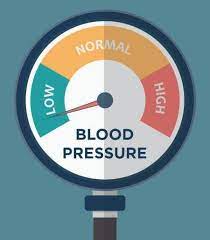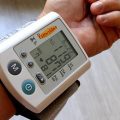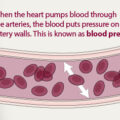What is blood pressure?
The heart pumps blood around the body through the blood vessels. Blood pressure is the amount of force exerted on the artery walls by the pumping of blood. Blood pressure varies according to environmental demands. For example, it rises during physical exertion and drops in extreme heat. Your blood pressure normally rises and falls throughout the day.
What do blood pressure numbers mean?
Blood pressure is measured using two numbers:
The first number, called systolic blood pressure, measures the pressure in your arteries when your heart beats.
The second number, called diastolic blood pressure, measures the pressure in your arteries when your heart rests between beats.
If the measurement reads 120 systolic and 80 diastolic, you would say, “120 over 80,” or write, “120/80 mmHg.”
What are normal blood pressure numbers?
A normal blood pressure level is less than 120/80 mmHg.1 No matter your age, you can take steps each day to keep your blood pressure in a healthy range.
What is low blood pressure?
Hypotension is the medical term for low blood pressure (less than 90/60). A blood pressure reading appears as two numbers. The first and higher of the two is a measure of systolic pressure, or the pressure in the arteries when the heart beats and fills them with blood.
How low is too low for blood pressure?
According to the American Heart Association, within certain limits, the lower your blood pressure reading is, the better. There is also no specific number at which day-to-day blood pressure is considered too low, as long as none of the symptoms of trouble are present.
What causes low blood pressure?
Low blood pressure can occur with:
- Prolonged bed rest
- Pregnancy: During the first 24 weeks of pregnancy, it’s common for blood pressure to drop.
- Decreases in blood volume: A decrease in blood volume can also cause blood pressure to drop. A significant loss of blood from major trauma, dehydration, or severe internal bleeding reduces blood volume, leading to a severe drop in blood pressure.
- Certain medications: A number of drugs can cause low blood pressure, including diuretics and other drugs that treat hypertension; heart medications such as beta blockers; drugs for Parkinson’s disease; tricyclic antidepressants; erectile dysfunction drugs, particularly in combination with nitroglycerine; narcotics and alcohol. Other prescription and over-the-counter drugs may cause low blood pressure when taken in combination with high blood pressure medications.
- Heart problems: Among the heart conditions that can lead to low blood pressure are an abnormally low heart rate (bradycardia), problems with heart valves, heart attack, and heart failure. Your heart may not be able to circulate enough blood to meet your body’s needs.
- Endocrine problems: Such problems include complications with hormone-producing glands in the body’s endocrine systems; specifically, an underactive thyroid (hypothyroidism), parathyroid disease, adrenal insufficiency (Addison’s disease), low blood sugar and, in some cases, diabetes.
- Severe infection (septic shock): Septic shock can occur when bacteria leave the original site of an infection (most often in the lungs, abdomen or urinary tract) and enter the bloodstream. The bacteria then produce toxins that affect blood vessels, leading to a profound and life-threatening decline in blood pressure.
- Allergic reaction (anaphylaxis): Anaphylactic shock is a sometimes-fatal allergic reaction that can occur in people who are highly sensitive to drugs such as penicillin, to certain foods such as peanuts, or to bee or wasp stings. This type of shock is characterized by breathing problems, hives, itching, a swollen throat, and a sudden, dramatic fall in blood pressure.
- Neurally mediated hypotension: Unlike orthostatic hypotension, this disorder causes blood pressure to drop after standing for long periods, leading to symptoms such as dizziness, nausea, and fainting. This condition primarily affects young people and occurs because of a miscommunication between the heart and the brain.
- Nutritional deficiencies: A lack of the essential vitamins B-12 and folic acid can cause anemia, which in turn can lead to low blood pressure.
Symptoms of low blood pressure
Most doctors will only consider chronically low blood pressure as dangerous if it causes noticeable signs and symptoms, such as:
- Dizziness or lightheadedness
- Nausea
- Fainting (syncope)
- Dehydration and unusual thirst
- Dehydration can sometimes cause blood pressure to drop. However, dehydration does not always cause low blood pressure. Fever, vomiting, severe diarrhea, overuse of diuretics, and strenuous exercise can all lead to dehydration, a potentially serious condition in which your body loses more water than you take in. Even mild dehydration (a loss of as little as 1 percent to 2 percent of body weight) can cause weakness, dizziness, and fatigue.
- Lack of concentration
- Blurred vision
- Cold, clammy, pale skin
- Rapid, shallow breathing
- Fatigue
- Depression
What to do if you notice a sudden decline in blood pressure
A single lower-than-normal reading is not causing alarm unless you are experiencing any other symptoms or problems. If you experience any dizziness, lightheadedness, nausea, or other symptoms, it’s a good idea to consult with your healthcare provider. To help with your diagnosis, keep a record of your symptoms and activities at the time they occurred.






